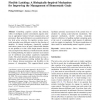Free Online Productivity Tools
i2Speak
i2Symbol
i2OCR
iTex2Img
iWeb2Print
iWeb2Shot
i2Type
iPdf2Split
iPdf2Merge
i2Bopomofo
i2Arabic
i2Style
i2Image
i2PDF
iLatex2Rtf
Sci2ools
103
click to vote
COGCOM
2010
2010
Flexible Latching: A Biologically-Inspired Mechanism for Improving the Management of Homeostatic Goals
Controlling cognitive systems like domestic robots or intelligent assistive environments requires striking an appropriate balance between responsiveness and persistence. Basic goal arbitration is an essential element of low level action selection for cognitive systems, necessarily preceding even deliberate control in the direction of attention. In natural intelligence, chemically regulated motivation systems focus an agent's behavioural attention on one problem at a time. Such simple durative decision state can improve the efficiency of artificial action selection by avoiding dithering, but taken to extremes such systems can be inefficient and produce cognitively implausible results. This article describes and demonstrates an easy-toimplement, general-purpose latching method that allows for a balance between persistence and flexibility in the presence of interruptions. This appraisal-based system facilitates automatic reassessment of the current focus of attention by existing acti...
| Added | 01 Mar 2011 |
| Updated | 01 Mar 2011 |
| Type | Journal |
| Year | 2010 |
| Where | COGCOM |
| Authors | Philipp Rohlfshagen, Joanna Bryson |
Comments (0)

